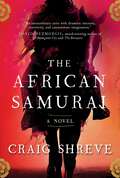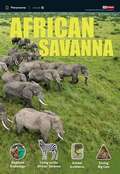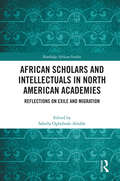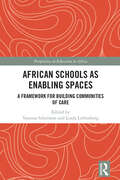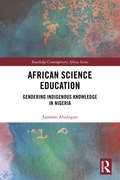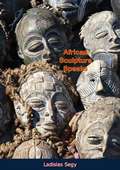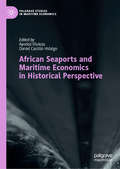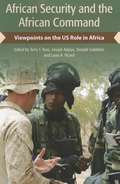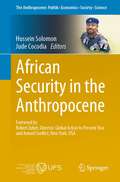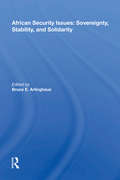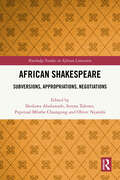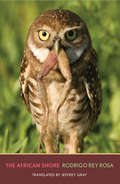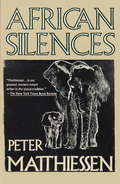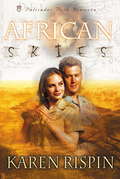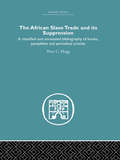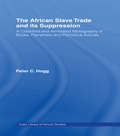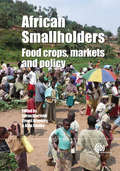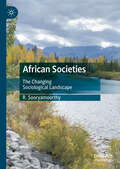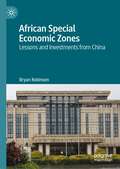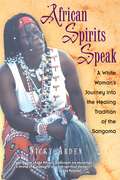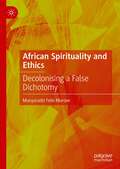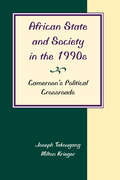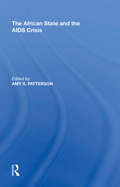- Table View
- List View
The African Samurai: A Novel
by Craig ShreveSet in late 16th-century Africa, India, Portugal, and Japan, The African Samurai is a powerful historical novel based on the true story of Yasuke, Japan&’s first foreign-born samurai and the only samurai of African descent—for readers of Esi Edugyan and Lawrence Hill.In 1579, a Portuguese trade ship sails into port at Kuchinotsu, Japan, loaded with European wares and weapons. On board is Father Alessandro Valignano, an Italian priest and Jesuit missionary whose authority in central and east Asia is second only to the pope&’s. Beside him is his protector, a large and imposing East African man. Taken from his village as a boy, sold as a slave to Portuguese mercenaries, and forced to fight in wars in India, the young but experienced soldier is haunted by memories of his past. From Kuchinotsu, Father Valignano leads an expedition pushing inland toward the capital city of Kyoto. A riot brings his protector in front of the land&’s most powerful warlord, Oda Nobunaga. Nobunaga is preparing a campaign to complete the unification of a nation that&’s been torn apart by over one hundred years of civil war. In exchange for permission to build a church, Valignano &“gifts&” his protector to Nobunaga, and the young East African man is reminded once again that he is less of a human and more of a thing to be traded and sold. After pledging his allegiance to the Japanese warlord, the two men from vastly different worlds develop a trust and respect for one another. The young soldier is granted the role of samurai, a title that has never been given to a foreigner; he is also given a new name: Yasuke. Not all are happy with Yasuke&’s ascension. There are whispers that he may soon be given his own fief, his own servants, his own samurai to command. But all of his dreams hinge on his ability to protect his new lord from threats both military and political, and from enemies both without and within. A magnificent reconstruction and moving study of a lost historical figure, The African Samurai is an enthralling narrative about the tensions between the East and the West and the making of modern Japan, from which rises the most unlikely hero.
African Scholars and Intellectuals in North American Academies: Reflections on Exile and Migration (Routledge African Studies)
by Sabella Ogbobode AbiddeThis book examines the process and events surrounding the migration of African scholars, as well as their lives and lived experiences within and outside of their colleges and universities. The chapters chronicle the lived-experiences and observations of African scholars in North America and examine a range of issues, ideas, and phenomena within North American colleges and universities. The contributors examine the political, ethnic, or religious upheavals that informed their migration or banishment; contrast the teaching-learning-research environment in Africa and North America; and discuss on and off-campus experience with segregation and racial inequality. This book will be of interest to students and scholars of the African Diaspora, migration, and African Studies.
African Schools as Enabling Spaces: A Framework for Building Communities of Care (Perspectives on Education in Africa)
by Vanessa Scherman Linda LiebenbergUsing African schools as case studies, this book presents an implementation framework that can be used by schools internationally to drive social change and support their role as enabling spaces, allowing learners to thrive. Recognising the increase in demands, violent conflicts, lack of stability, and social strain prevalent within the current African school system, this book covers the challenges that negatively impact children's development by understanding and presenting a framework that ensures a holistic social and educational support system can be created for students. Featuring contributions from a broad range of leading scholars, the book ultimately addresses the critical need in academic and practice research for the importance of schools in building civil societies. Arguing for the importance of schools as places of stability, social inclusivity, and communities of care, this book will have direct relevance to academics, researchers, and post-graduate students in the field of education policy, international and comparative education and character education. Those working in school leadership, management and administration environments will also benefit from this volume.
African Science Education: Gendering Indigenous Knowledge in Nigeria (Routledge Contemporary Africa)
by Jamaine AbidogunBased on interrogation and review of historical and current cultural and indigenous knowledge combined with extensive curriculum and classroom analysis, this book identifies how indigenous science gender roles may be utilized to provide a more gender balanced and indigenous centered learning experience. The book argues for the integration of African indigenous science into the secondary school curriculum as a way to strengthen students’ science comprehension by affirming their society’s science contributions, making clear connections between Indigenous and Western science, and also as a way to promote female representation in the sciences. This book will be of interest to scholars and practitioners of science education, African education, and indigenous knowledge.
African Sculpture Speaks
by Ladislas SegyPABLO PICASSO: “…when the form is realized, it is there to live its own life.”HENRY MOORE: “The sculpture which moves me most is full-blooded and self-supporting, fully in the round; giving out something of an energy and power of great mountains, it has a life of its own independent of the object it represents.”African Art Speaks, the first full appraisal of African art published in the United States, describes and illustrates the sculpted works of more than 150 West African tribes.Ladislas Segy approaches African art from several different but interrelated perspectives, considering the sculptures first as products of a distinct African culture, then as high-quality works of art. Seeking to bring the African carver’s work within the scope of the Western observer, Segy stresses the need for appraising African art within in its own context, suspending established procedures for art appreciation and viewing the object as it actually is, not as we think it is or should be.Bringing to bear the disciplines of aesthetics, anthropology, psychology, and phenomenology, Segy shows how the deep-seated magico-religious beliefs of the tribal carver creates such powerful emotional tension in his work that the viewer can recapture this emotion and identify it as part of his own experience.This present edition is the Third Printing, originally published in 1961, and provides a systematic Style Guide, analyzing the characteristic features of the different styles of tribal sculpture. A special chapter for the collector tells how to buy and care for African art. Segy also discusses the styles of the main sculpture-producing tribes in East and South Africa. Included are maps, a bibliography and a list of illustrations.“While much has been written about African sculpture within recent years, Mr. Segy’s book is undoubtedly among the finest published in this country.”—The San Francisco Chronicle
African Seaports and Maritime Economics in Historical Perspective (Palgrave Studies in Maritime Economics)
by Ayodeji Olukoju Daniel Castillo HidalgoThis book updates African maritime economic history to analyse the influence of seaports and seaborne trade, processes of urbanization and development, and the impact of globalization on port evolution within the different regions of Africa. It succeeds the seminal collection edited by Hoyle & Hilling which was conceived during a phase of sustained economic growth on the African continent, and builds on a similar trend where African economies have experienced processes of economic growth and the relative improvement of welfare conditions. It provides valuable insights on port evolution and the way the maritime sector has impacted the hinterland and the regional economic structures of the affected countries, including the several and varied agents involved in these activities. African Seaports and Maritime Economics in Historical Perspective will be useful for economists, historians, and geographers interested in African and maritime issues, as well as policy makers interested in path-dependence and long-term analysis
African Security and the African Command: Viewpoints on the US Role in Africa
by Terry F. Buss Joseph Adjaye Donald Goldstein Louis A. Picard<p>After the end of the Cold War and a failed mission in Somalia, the US decided to wash its hands of major military operations in Africa. Within the past few years, however, strategic interests in the region have grown, based largely on the threat of international terrorist group activities there. In 2007, the Bush Administration created a new military presence in Africa, AFRICOM (United States Africa Command), professed to be based not on occupying military or fixed bases, but rather on capacity building for and collaboration with African security forces. <p>Some see AFRICOM as the answer to an African security system crippled by a lack of resources, widespread politicization and institutional weakness. Others claim the program is nothing more than a characteristic attempt by the US to secure its own interests in the region without regard to the actual needs of Africans. A variety of viewpoints on the debate, both from the US and Africa, come together in this collection to examine the objectives and activities of AFRICOM. The result provides the reader with a well-rounded picture of longstanding security challenges in Africa and what might be done to address them.</p>
African Security in the Anthropocene (The Anthropocene: Politik—Economics—Society—Science #36)
by Hussein Solomon Jude CocodiaMuch has been written on security in Africa—its democratic deficit, poor civil-military relations, and myriad conflicts—but these are often treated in isolation from one another. This book takes a different approach, as it links all of these issues to the dynamics of the Anthropocene. Penned by African scholars on the continent and in the diaspora, it examines the different challenges not as separate entities but as outcomes of the Anthropocene Age. In this geological epoch, humans have become a global force—unfortunately, not necessarily for good. The interaction between humans and the climate, the effects of waste, the impact of pollution on marine and terrestrial ecosystems, the loss of biodiversity, and the change in the chemical composition of the soil, oceans and atmosphere are key identifiers of the age of the Anthropocene. This has fueled conflict and instability from the vast swathes of the Sahel to Somalia. Responding to these issues of insecurity without understanding their inter-connectedness and how this relates to the environment can only result in failure. From this perspective, the current structures in place are inadequate for the task of confronting insecurity at the state and continental levels, as represented by the African Union. What is needed is a radical reevaluation of Africa’s security architecture and approach to security. This necessitates pooling sovereignty on a continental and global level. It necessitates less state-centric responses that include civil society and the business community as equal partners of states in order to collectively confront insecurity in the age of the Anthropocene.• The authors are academics, policy makers and military veterans who have worked in building capacity on the African continent• The book is comprehensive in scope, strong on theory, pragmatic in policy and reflects experience from the field.• The authors approach makes the book easy, interesting and intriguing.
African Security Issues: Sovereignty, Stability, And Solidarity
by Bruce E. ArlinghausAs African nations emerge more fully from the immediate postinde-pendence era, there is a pressing need to examine their security concerns from both African and global perspectives. Issues of strategic access and resources, superpower and regional conflict, economic growth and internal stability, and the role of African nations as a significant blo
African Shakespeare: Subversions, Appropriations, Negotiations (Routledge Studies in African Literature)
by Ifeoluwa Aboluwade Serena Talento Pepetual Mforbe Chiangong Oliver NyambiAfrican Shakespeare: Subversions, Appropriations, Negotiations uncovers the multidimensional inventions, synergies, and experimentations that have emerged from performative, political, literary, and conceptual encounters with Shakespeare and his oeuvre in African contexts. Divided into three broad and overlapping parts, the chapters of the book critically explore issues of decoloniality and postcoloniality; nation-building and state corruption; history and memory; gender and feminism; translation and adaptation from diverse theoretical standpoints. The book displaces the emphasis on Shakespeare’s works to productively illuminate the multi-layered significance of African epistemes, politico-aesthetics, languages and socio-cultural realities to the practice and process of literary and theatrical intervention and creation. Building on and extending extant scholarship in the field of African Shakespeare, the contributions in the volume not only enhance knowledge of African Shakespearean creations but also enrich African Studies and Shakespeare Studies by opening up new possibilities for transdisciplinary dialogues and cross-fertilization.The book will be useful for students and scholars of African Theatre and Performance, Cultural Studies, (Global) Shakespeare Studies, Translation and Adaptation Studies and Post-colonial Studies.
The African Shore
by Jeffrey Gray Rodrigo Rey RosaIn the vein of the writings of Paul Bowles, Paul Theroux, and V. S. Naipaul, The African Shore marks a major new installment in the genre of dystopic travel fiction. Rodrigo Rey Rosa, prominent in today’s Guatemalan literary world and an author of growing international reputation, presents a tale of alienation, misrecognition, and intrigue set in and around Tangier. He weaves a double narrative involving a Colombian tourist pleasurably stranded in Morocco and a young shepherd who dreams of migrating to Spain and of #147;riches to come. ” At the center of their tale is an owl both treasured and coveted. The author addresses the anxiety, distrust, and potential for violence that characterize the border of all borders: the strait that divides Africa and Europe, where the waters of the Mediterranean and the Atlantic meet. His often-remarked prose style, at once rich and spare, endows his work with remarkable elegance. Rey Rosa generates a powerful reality within his imagined world, and he maintains a narrative tension to the haunting conclusion, raising small and large questions that linger in the reader’s mind long after the final page. With an Afterword by Jeffrey Gray
African Silences
by Peter MatthiessenAfrican Silences is a powerful and sobering account of the cataclysmic depredation of the African landscape and its wildlife. In this critically acclaimed work Peter Matthiessen explores new terrain on a continent he has written about in two previous books, A Tree Where Man Was Born -- nominated for the National Book Award -- and Sand Rivers.Through his eyes we see elephants, white rhinos, gorillas, and other endangered creatures of the wild. We share the drama of the journeys themselves, including a hazardous crossing of the continent in a light plane. And along the way, we learn of the human lives oppressed by bankrupt political regimes and economies, and threatened by the slow ecological catastrophe to which they have only begun to awaken.
African Skies
by Karen RispinThough Laurel Binet and Darren Grant both love their work in exotic Africa, they can't stand each other. Their opposing passions spark arguments over what's really important: she's investing her life in the study of wildlife for a master's degree; he has no time for people who waste their energies serving animals when people need food and shelter. When their worlds collide during calamitous seasons of starvation and epidemic, Darren and Laurel have to learn to work together. Encounters with deadly snakes, the unscrupulous acts of a fanatical conservationist, and a frightening kidnapping force both Laurel and Darren to examine their faith -- and their feelings for one another. Can love bring harmony where once there was war?
African Slave Trade and Its Suppression: A Classified and Annotated Bibliography of Books, Pamphlets and Periodical Articles
by Peter C. HoggFirst Published in 2005. Routledge is an imprint of Taylor & Francis, an informa company.
The African Slave Trade and Its Suppression: A Classified and Annotated Bibliography of Books, Pamphlets and Periodical
by Peter C. HoggA comprehensive bibliography dealing specifically with African slave trade. This volume has been sub-classified for easier consultation and the compiler has provided, where possible, descriptions and comments on the works listed.
An African Slaving Port and the Atlantic World: Benguela and Its Hinterland
by Mariana P. CandidoThis book traces the history and development of the port of Benguela, the third largest port of slave embarkation on the coast of Africa, from the early seventeenth to the mid-nineteenth century. Benguela, located on the central coast of present-day Angola, was founded by the Portuguese in the early seventeenth century. In discussing the impact of the trans-Atlantic slave trade on African societies, Mariana P. Candido explores the formation of new elites, the collapse of old states, and the emergence of new states. Placing Benguela in an Atlantic perspective, this study shows how events in the Caribbean and Brazil affected social and political changes on the African coast. This book emphasizes the importance of the South Atlantic as a space for the circulation of people, ideas, and crops.
African Smallholders: Food Crops, Markets and Policy
by Göran Djurfeldt Ernest Aryeetey Aida IsinikaBased on highly topical international research in a high-priority area, this book documents the farm-level effects of the reorientation of agricultural policies with different themes for the different countries such as micro-credit, infrastructure, cash crop production and food security. It discusses staple food production in sub-Saharan Africa and its response to changing geo-political, macro-economic and agricultural policy, to deepen our understanding of how agricultural development unfolds at farm level. It is a useful resource for all those researching or involved with food security, agricultural development and African food planning.
African Socialism in Postcolonial Tanzania
by Priya LalDrawing on a wide range of oral and written sources, this book tells the story of Tanzania's socialist experiment: the ujamaa villagization initiative of 1967–1975. Inaugurated shortly after independence, ujamaa ('familyhood' in Swahili) both invoked established socialist themes and departed from the existing global repertoire of development policy, seeking to reorganize the Tanzanian countryside into communal villages to achieve national development. Priya Lal investigates how Tanzanian leaders and rural people creatively envisioned ujamaa and documents how villagization unfolded on the ground, without affixing the project to a trajectory of inevitable failure. By forging an empirically rich and conceptually nuanced account of ujamaa, African Socialism in Postcolonial Tanzania restores a sense of possibility and process to the early years of African independence, refines prevailing theories of nation building and development, and expands our understanding of the 1960s and 70s world.
African Societies: The Changing Sociological Landscape
by R. SooryamoorthyThis book addresses a notable gap in African sociological knowledge by leveraging extensive empirical data covering all 54 African countries and drawing on historical insights from across the continent. Offering a nuanced understanding of African society, it signifies an unprecedented endeavour committed to unravelling the intricate tapestry of African society. The analysis presented in the book goes into the dynamic evolution of sociological topics, their interconnections with African knowledge, the identification of contemporary themes, methodological diversity, and contemporary challenges and issues of indigenisation, decolonisation, and promoting an Africa-centered sociology.
African Special Economic Zones: Lessons and Investments from China
by Bryan RobinsonThis book evaluates African Special Economic Zones from the perspective of learning from China’s experiences with such Zones and the impact of Chinese policy and investment on African Zones. Utilising case studies of perceived successful Special Economic Zones in China, the book proposes the Chinese Model of Special Economic Zones as an evaluation and benchmarking tool against which African Special Economic Zones are considered. Applying several case studies on African Special Economic Zones, the book then details the competitiveness of African Special Economic Zones with a specific focus on attracting Chinese investors to these Zones. The economic, social and environmental impact of these zones are appraised. African Nations’ efforts, or lack thereof, to enable successful Special Economic Zones are critically analysed. Finally, Special Economic Zones in Africa are compared against the Chinese Model; and an African Model of Special Economic Zones is proposed. Recommendations are presented to both African Nations’ leadership and Chinese policymakers and investors as to how these Zones can be improved to enhance competitiveness and the attainment of the Zones’ sustainable development objectives.
African Spirits Speak: A White Woman's Journey into the Healing Tradition of the Sangoma
by Nicky ArdenThe moving story of an expatriate coming to terms with her country's history, and her joyous spiritual and emotional rebirth as an African healer. • One of the first accounts of the mysterious sangomas, the healers of South Africa's black population. • A mystical journey that will appeal to those wishing to reunite with their roots and a more spiritual life.Set against the stirring backdrop of a crumbling apartheid regime, African Spirits Speak is the lyrical account of white South African Nicky Arden's journey into the world of the sangomas, the diviners, doctors, psychologists, and priests of South Africa's black population. While in her early twenties Nicky fled South Africa with her husband as the stranglehold of apartheid tightened on her native land. For twenty-two years they lived in California as expatriates--never once returning to their homeland--until a deep depression, followed by a spiritual awakening in the California desert, compelled Nicky to return to South Africa. During her visit, while exploring deep in the bush, she unexpectedly met an old black medicine woman--a sangoma. This meeting would change her life. Few white South Africans are even aware of the world of the sangomas, but this prophetic old woman saw in Nicky the spirit of a fellow healer and set the author on a mystical journey that would reunite her soul with its African roots. Thus began her astonishing and complex initiation into a nearly unknown world and her quest to discover the truth about herself and her heritage.
African Spirituality and Ethics: Decolonising a False Dichotomy
by Munyaradzi Felix MuroveThis book explores the symbiotic relationship that exists between African spirituality and ethics. Felix Murove discusses how these two concepts are entwined, and illustrates how they play a role in applied ethical issues. He argues that the general understanding of spirituality in Africa stems from Christianity, which has had a negative impact on African indigenous spirituality. The conceptual tools that run throughout the book are considerably Afro-centric, a methodological strategy which inevitably requires the reader to adopt some prior willingness to learn these Afro-centric concepts without easily resorting to western Christian and philosophical categories of thought. The book advocates for an Afro-centric conceptualization of spirituality and ethics, and encourages the reader to adopt a more holistic approach to African spirituality.
African State And Society In The 1990s: Cameroon's Political Crossroads
by Joseph TakougangAfrican State and Society in the 1990s is the first comprehensive English language book to appear on Cameroon's political events since 1989. Designed for academic and policy studies readers, it covers developments from the 1960s to the present as background for an analysis of the continuing conflict since 1990 between the regime and political oppos
The African State and the AIDS Crisis (Global Health Ser.)
by Amy S. PattersonThis edited volume analyzes African state responses to the AIDS epidemic. Institutionally weak, limited in resources and lacking power in the international system, the African state has been characterized as inefficient, corrupt and illegitimate. The volume questions how aspects of the African state have affected policy responses to AIDS. It highlights how African states must initiate, develop and/or implement the long-term policy solutions necessary to combat AIDS. It employs empirical studies from the international and national arena to illustrate why some African states have been able (and willing) to address AIDS while others have not. Contributions analyze how international actors, civil society organizations, state ideology, patriarchy and state capacity have influenced policies to fight AIDS. Examining AIDS policies through the prism of African state development and linkages to domestic and international actors, this book provides a nuanced understanding of the variety of responses to AIDS in Africa.
